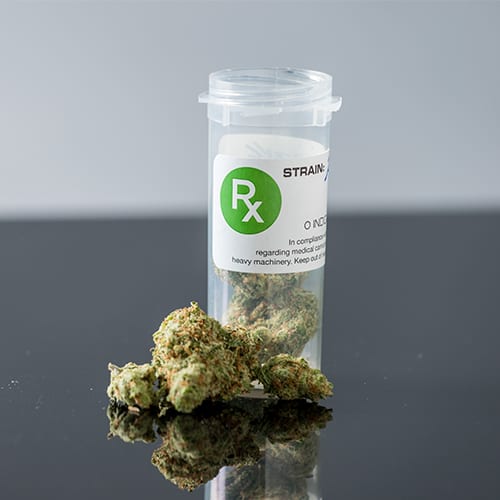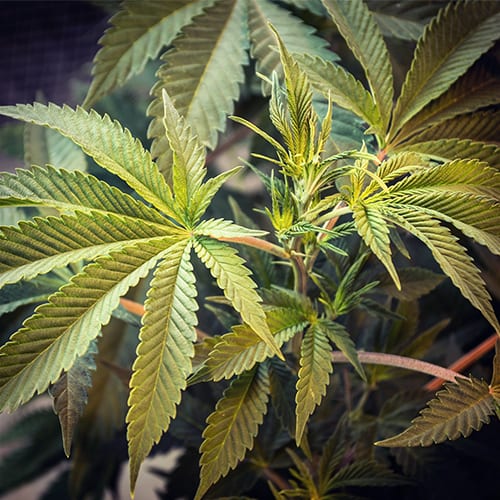
Editor’s Note: This is not intended as medical advice. If you are suffering from an eating disorder, depression, or anxiety, consult a doctor or therapist. While cannabis has been shown to have positive effects on a number of mental health issues, it is important to seek professional medical and psychological help to effectively treat your condition.
“I never thought I would feel so relieved to feel hungry again.”
This is how Alison, a 21-year-old art student, explains her first experience with marijuana. She has struggled with an eating disorder from the age of fifteen – and she’s one of many people who self-medicate their eating disorder with marijuana.
“Sometimes I get really bad and I have periods where I become very agitated. I can’t even look at food without wondering about its weight and calories,” she explains. “Weed silences the voice in my head that can’t stop talking about calories.”
Alison, who has been hospitalized for her eating disorder three times, says that weed works better than any medication she’s ever tried. She suffers from clinical depression, post-traumatic stress disorder, and obsessive-compulsive disorder.
Being able to eat means she’s able to study and waitress to pay her rent. “It’s definitely not a long-term solution. No medication is. But while I’m working through issues with my therapist, it’s what ensures that I eat. I can’t go to therapy if I’m fatigued or sore from not eating,” she says.
Using Cannabis to Help Treat Eating Disorders
There is a lack of conclusive research on the link between cannabis and eating disorders. In fact, as NEDA notes, there is a lack of research on eating disorders, in general.
It would seem that this lack of information hasn’t prevented a great deal of eating disorder patients from using marijuana. Physician Sona Patel of Doc420has noted that many anorexic patients have been medicating with marijuana in recent years. She cites the appetite-inducing effect of weed to be useful for restoring the sense of hunger eating disorders take away. Eating disorders are often associated with anxiety disorders, and as Dr Patel says, marijuana can alleviate those symptoms.
Speaking to VICE last year, Los Angeles-based psychologist Dr. Beth Braun noted the effects of weed on her patients with eating disorders. Those patients who smoked cannabis seemed to recover more successfully than those who took psychotropic medication.
Eating disorders are a common but often misrepresented mental illness. According to NEDA’s statistics, over 20 million women and 10 million men in the United States suffer from an eating disorder at some point in their lives. Studies show that anorexia nervosa has the highest mortality rate of all psychiatric disorders. Those with eating disorders often have mood disorders like depression, a tendency towards substance abuse, and are at an elevated risk for obsessive-compulsive disorders.
Eating disorders are also deeply stigmatized and seldom discussed. Alison mentions that her conservative Afrikaans family in South Africa, who praised her sudden weight loss, struggled to identify her eating disorder as a problem. To them, being thin was something desirable, and her sudden weight loss was no cause for alarm.
Postgraduate law student Shivani has had a similar experience. “I’m Indian, and in my culture, we don’t discuss eating disorders… I think this is maybe why people seek alternative forms of treatment,” she says.
While Shivani hasn’t officially been diagnosed with an eating disorder, she suspects her difficulties with eating stem from her anxiety disorder. “Nearly anything can trigger my anxiety, but eating especially,” she says. “I guess I associate it with family meal times, and I associate that with being very uncomfortable. When I feel hungry, my hunger is soon replaced with anxiety.”
Her discomfort around meal times stems from having been abused as a childhood. “For me, dinner was a time when my entire family would sit together and either ignore each other or argue,” she recalls. Her family’s interactions at the dining table often left her feeling humiliated and worthless. “I remember sitting in my room at the age of eleven, dreading dinner, wishing I never had to eat with them again. But every night at 6 o’ clock I would have to go downstairs and face my family again.”
Her difficulties with eating only became visible when she moved out of her childhood home to go to university. Without being forced to attend meals, she could avoid it – just as she always wanted to do. While she didn’t mind eating snacks on the go, she wouldn’t be able to sit down and eat a full meal.
In her first year away from home, she lost nearly 30 pounds. Starved for nutrition, she was constantly ill, had regular muscle aches, and always felt fatigued. Her hair began to fall out, her skin became dry and flaky, and she drowned in her regular clothes. However, she says she was in denial about her disorder. “I didn’t initially recognize it as a problem. I thought, ‘oh, I’m too busy with school to eat anyway.’”
Things changed one day when her roommate offered her a joint. After taking a hit, she felt slightly more calm than usual. Later on, when friends invited her for a sit-down meal, she keenly agreed. She says it was then that she realised she hadn’t had a sit-down meal in so long. “I was so unused to feeling hungry, genuinely hungry, but not anxious,” she says. “I asked myself why, and then I realised I desperately needed help.”
For the next three years, she underwent intense psychological therapy. She began to feed herself healthy meals, using cannabis when she felt too anxious to eat. Her physical health began to improve dramatically. Now, she only uses weed on occasion – but she swears it kick-started her recovery. “Weed fixed a problem I didn’t know I had,” she says. “Without it, I might have been in denial about my eating disorder until it killed me.”
Cannabis Not a Cure-All for Everyone
A number of experts have warned eating disorder patients against potential bad reactions to cannabis – especially for those patients who are somewhat undernourished. Around 50 percent of people with eating disorders have some kind of substance abuse problem, so it’s possible that some patients might become emotionally dependent on, even if not addicted to, marijuana.
For those who are bulimic, it’s always possible that overeating after or during a high will lead to them feeling guilty and purging afterwards. This is perhaps something that doesn’t particularly affect Shivani, since her disordered eating isn’t a manifestation of body image issues but anxiety and PTSD.
But naturally, some people with eating disorders have had bad experiences with marijuana. “Weed makes me relax and feel hungry, but if I eat a lot I feel guilty and sometimes purge afterwards,” says Cameron, a 25-year-old schoolteacher. Cameron was diagnosed with bulimia nervosa when she was 20. “I know weed works for others, so maybe it’s just the particular kind of weed I used. It just makes things worse for me.”
Neil, a 24-year-old travel agent, also has only had negative experiences when trying to self-medicate with marijuana. “I played a lot of sports in high school, and when I stopped, I gained weight. I started reading up on nutrition and dieting and I constantly weighed my food and counted calories… It became almost like an obsession,” he says. He explains that after he realised he restricted his meals drastically and became incredibly depressed, he sought psychological help.
“When I was diagnosed with anorexia… I mean it was obvious that’s what it was, but I didn’t believe it. Usually you think only girls can be anorexic,” he says. A friend who self-medicated their depression with weed suggested it to him. When he tried it, his situation worsened. “It made me more depressed and lethargic. I felt even more insecure than before.” Like Cameron, Neil thinks it may be the strain of marijuana he tried.
Emma, a 22-year-old student, has also successfully used weed to treat her eating disorder. “My family did not know how to respond to my eating disorders and I started using weed to cope with the anxiety,” she says. Later on, she realized that cannabis gave her an appetite that couldn’t be suppressed. When she ate, she was able to enjoy her food. “When I decided I needed to get myself together I started using it periodically each day to make sure I would have an appetite,” she says.
Emma has body dysmorphia manifesting as anorexia and bulimia. Additionally, she has anxiety, depression, and obsessive-compulsive disorder. The first two years of medicating with marijuana went really well, but thereafter its efficacy wore off slightly. “I realised there was a tipping point where if you become a regular smoker your appetite vanishes,” she notes. “It managed to get me out of the relapse period well though, and I’ve been able to sustain manageable eating habits since.”
While Emma would recommend trying cannabis to other people with eating disorders, she would warn them to be cautious – especially if they have had bad reactions to it in the past. “It can be a really bad depressant if you aren’t in a prepared headspace for it,” she says, noting that certain strains work better for certain people. She adds that, in large doses, it negatively affected her emotional stability and motivation.
She also warns others against developing a psychological dependency on marijuana. “If you’re relying on it to give you an appetite or make you feel more able to cope with your struggles, you’re developing a psychological dependency even if it isn’t an addiction,” she explains.
Alison agrees, saying that a holistic approach is important to treating eating disorders. This includes finding a psychologist and looking for supportive friends and family members. “Weed might help you eat, but there’s a reason why you’re not eating in the first place. It might ease the symptoms but it won’t remove the cause,” she says.
SOURCE: MASSROOTS.COM







